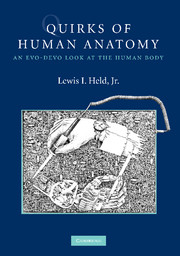Book contents
- Frontmatter
- Contents
- Preface
- CHAPTER 1 BACKGROUND
- CHAPTER 2 SYMMETRY AND ASYMMETRY
- CHAPTER 3 MYSTERIES OF THE MIDLINE
- CHAPTER 4 MERISM AND MODULARITY
- CHAPTER 5 SEXUAL DIMORPHISMS
- CHAPTER 6 SILLY, STUPID, AND DANGEROUS QUIRKS
- CHAPTER 7 MIND AND BRAIN
- EPILOGUE
- APPENDIX: QUIRKS OF HUMAN BEHAVIOR
- References
- Index
Preface
Published online by Cambridge University Press: 05 August 2012
- Frontmatter
- Contents
- Preface
- CHAPTER 1 BACKGROUND
- CHAPTER 2 SYMMETRY AND ASYMMETRY
- CHAPTER 3 MYSTERIES OF THE MIDLINE
- CHAPTER 4 MERISM AND MODULARITY
- CHAPTER 5 SEXUAL DIMORPHISMS
- CHAPTER 6 SILLY, STUPID, AND DANGEROUS QUIRKS
- CHAPTER 7 MIND AND BRAIN
- EPILOGUE
- APPENDIX: QUIRKS OF HUMAN BEHAVIOR
- References
- Index
Summary
Once upon a time, we thought we were created in the image of a perfect deity. Then came Darwin. In the very first chapter of his Descent of Man (1871), he took pains to point out the many flaws in our anatomy, including our useless—but dangerous—appendix, our pathetic covering of body hair, and the silly little muscles that let us wiggle our ears. Each of these odd traits is an anachronism inherited from our nonhuman ancestors.
Of course, the very idea that we had nonhuman ancestors was implicit in Darwin's earlier Origin of Species (1859). That book shook the world. The present book has a much humbler aim: to honor the 150th anniversary of Origin and, coincidentally, the 200th birthday of the man himself (b. 12 February 1809).
In Chapter 13 of Origin, Darwin asserted that the evidence from embryology alone was strong enough to convince him of the principle of common descent. Having taught embryology myself for more than 20 years, I know what he meant. Human embryos make many structures we don't need, and we destroy others after we've gone to the trouble of making them. No engineer in his right mind would ever allow such idiocy. Only in the light of evolution do these processes make sense [1265], and only in the language of genetics can we comprehend their tortuous logic [2496]. Unfortunately, genetics blossomed only after Darwin died (19 April 1882). In Chapter 5 of Origin, he lamented his failure to trace the causes of heritability.
- Type
- Chapter
- Information
- Quirks of Human AnatomyAn Evo-Devo Look at the Human Body, pp. vii - xiiPublisher: Cambridge University PressPrint publication year: 2009



